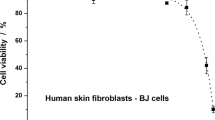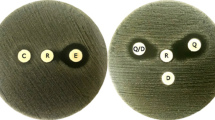Abstract
THE observation that the Staphylococcus can inhibit the growth of other bacteria has been recorded, in some fifty papers over a period of sixty years, beginning with Babès1, who showed that a Staphylococcus inhibited the growth of B. anthracis and of another Staphylococcus. The majority of reports have been concerned with the action of Staphylococci against the diphtheria bacillus. In 1909, Schi?tz2 recorded the observations that a patient with a staphylococcal sore throat, nursed in a diphtheria ward because of a mistaken diagnosis, did not develop diphtheria, and that carriers became free of the diphtheria bacillus during a non-specific throat infection. There followed a number of attempts, mostly in the United States, to use Staphylococci in a spray to treat diphtheria carriers.
This is a preview of subscription content, access via your institution
Access options
Subscribe to this journal
Receive 51 print issues and online access
$199.00 per year
only $3.90 per issue
Buy this article
- Purchase on Springer Link
- Instant access to full article PDF
Prices may be subject to local taxes which are calculated during checkout
Similar content being viewed by others
References
Babès, V., J. Conn. Méd. Prat. Paris, 7, 321 (1885).
Schiøtz, A., Ugeskrift f. LÅ"ger, Copenhagen, 71, 1373 (1909).
Dujardin-Beaumetz, E., C.R. Soc. Biol., Paris, 110, 1210 (1932).
Author information
Authors and Affiliations
Rights and permissions
About this article
Cite this article
JENNINGS, M., SHARP, A. Antibacterial Activity of the Staphylococcus. Nature 159, 133–134 (1947). https://doi.org/10.1038/159133a0
Issue Date:
DOI: https://doi.org/10.1038/159133a0
This article is cited by
-
Early development of the skin microbiome: therapeutic opportunities
Pediatric Research (2021)
-
Zur Frage der antilbakteriellen Wirkung des Speichels
Zeitschrift für Hygiene und Infektionskrankheiten (1952)
Comments
By submitting a comment you agree to abide by our Terms and Community Guidelines. If you find something abusive or that does not comply with our terms or guidelines please flag it as inappropriate.



